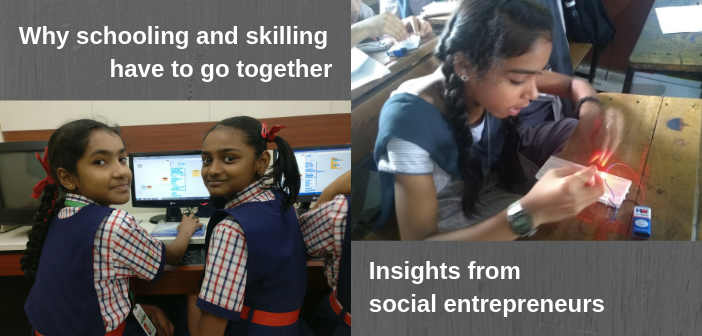India’s vision for 2030 has skill-based training as one of the crucial points on the agenda for socioeconomic development. The youth of 2030 constitute today’s school-going children who are not aware of what it means to adapt and work in a world that’s constantly changing. Being tomorrow’s workforce and job creators, the students in the K-12 segment form the base that needs a strong orientation in multiple skills such as cognitive, social, behavioural, technical and vocational. Adopting and implementing a 21st century skill-focused curriculum in schools will equip students to become lifelong learners. We look at different areas that schools need to invest to complement the current curriculum and empower students with different skills.
Future-ready Digital Skills
Technology is rapidly disrupting the nature of workplace, jobs and the traditional notion of permanent employment. This dynamic nature of the workplace requires students to adapt and learn continuously through formal and informal ways. Gyanada Foundation and Universe Simplified Foundation, the organizations featured in this article, are supported by UnLtd India under the social entrepreneurship incubation program.
Gyanada Foundation, a not-for-profit organisation based in Mumbai is addressing this technology gap in schools through their Binary Program. The program imparts relevant skills and provides practical exposure to students by introducing them to computer science. They believe in unleashing the thinking capabilities of a child through creativity, rather than an educational system that is grade driven. The program also enables the current budding workforce such as engineering students to actively participate in teaching the children.
Gyanada Foundation started with an electronics boot camp which helped them realise that children are interested in learning if they are provided with the right content. Their intervention in technology-integrated education started with a 6-month pilot with 12 girls. It is now grown to be a 3-year course with over 108 students.

“We found that the current computer courses offered by the curriculum are mainly user-driven that limits their learning and understanding about computers as a subject. Hence, we introduced students to programming, a developer driven approach. Binary Story introduces students to block and script-based coding like Scratch and Python from Class 7. We want to boost how children think, not what they think”, shares Rinsa Perapadan from Gyanada Foundation.
Rinsa also highlights that, “back in 2005, National Curricular Framework (NCF) had strongly recommended Computer Science from class 5 to 8. Going by NCF, algorithms, general problem-solving strategies, iterative processes, and role of computing in modern society should have been included in the school curriculum. But, the students still continued to learn MS Office. To a great extent, programs like Atal Tinkering Labs can promote these subjects, provided, they follow a proper structure. This will help in making students creators of software, keeping the future jobs in mind. Though the policymakers are aware of this issue, they need to act fast to reduce the undesirable impact.”
 Embracing flexible jobs, not life-time careers
Embracing flexible jobs, not life-time careers
Career progression through vertical growth may become a thing of the past as new jobs demand new skills. Future job seekers need to be flexible and adaptive in their skill set in order to successfully thrive in a diverse market. Hence, school curriculums need to focus on shaping children to be agile thinkers and doers. Subjects taught in the classroom need to cultivate a solution-centric approach and resilience in children in order to cope with the changing times.

Universe Simplified Foundation, a not-for-profit organization that works in and around Mumbai is using a design-centric approach to develop problem-solving and reasoning skills in students. They setup low-cost Innovation Hubs in schools and community centers for children to unleash their creativity to address local challenges. Elucidating their vision Henna Khan, the founder of Universe Simplified Foundation says, “Our Science, Technology, Engineering, Math (STEM) based curriculum requires active collaboration between students to decide how to apply their textbook knowledge in real life.” The duration of the course is three years; run on a once a week basis. The course encourages the students to think out of the box and use limited material to design solutions. This encourages them to collaborate, develop their thinking abilities, and help them discover their passion. They are currently working with around 300 children in urban and rural areas from economically challenged backgrounds.
Henna highlights the fact that Engineering students lack hands-on skills and their idea of engaging them as facilitators gives them the right exposure. She adds, “Exposing students in secondary schools to various skills will give them the flexibility to try out different options before choosing a specialized subject. Practical knowledge and experience should be given more weightage while selecting people for jobs. This will reduce the emphasis on rote learning and encourage students to pick up subjects that actually interest them.”
Introducing skill-based activities and learning modules can reform our education system that has remained rigid and non-responsive to the dynamic workplace. Acquiring new skills and exploring their talents plays a rewarding role in the life of students. While schooling facilitates the acquisition of knowledge, values and habits, skilling exposes the students to the real-work environment. We need both the interventions to make our youth future-ready!














Comments 1